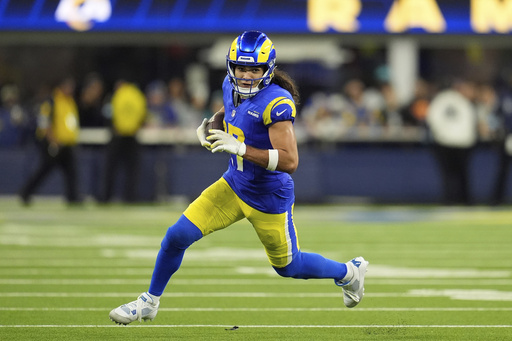
INGLEWOOD, Calif. — Sean McVay, head coach of the Los Angeles Rams, has been experimenting with various lineup arrangements throughout the regular season due to ongoing injury challenges. Although McVay welcomed back some offensive linemen on Monday night, the team’s lack of consistency ultimately contributed to their 23-15 defeat against the Miami Dolphins.
The Rams had to rely on five field goals by Joshua Karty, which signifies the eighth occasion in McVay’s tenure that the team has not managed to score an offensive touchdown. This outcome was particularly notable as it marked just the second time in Matthew Stafford’s 50 starts as the Rams’ quarterback that the team was unable to find the end zone. Interestingly, both occurrences transpired during Monday night games.
“We struggled to find any rhythm of complementary football,” McVay remarked. He expressed satisfaction with the defense, noting their ability to limit the Dolphins’ scoring, create negative plays, generate turnovers, and provide the offense with short field positions. However, he acknowledged that the offense failed to capitalize on these opportunities.
Before the game, both left guard Steve Avila and center Jonah Jackson were activated from injured reserve after spending time recovering from injuries. Avila sustained a knee injury in the season opener against Detroit, while Jackson dealt with a shoulder injury the following week against Arizona. Joe Noteboom filled in at right tackle for Rob Havenstein, who is sidelined with an ankle injury.
Avila, who began training camp at center before switching to guard, mentioned the need to improve their coordination as the season progresses. “We felt somewhat prepared this week, but we faced numerous challenges that we need to address,” he stated.
During the first half, Stafford was sacked three times, totaling four sacks by the end of the game. NFL’s Next Gen Stats indicated that Stafford was pressured on 15 of his 49 pass attempts, maintaining a pressure rate of 30.6%, which is comparable to his season average of 30.7%. “Early on, it felt a bit shaky, but as the game continued, protection improved somewhat, allowing us to drive the ball better,” McVay noted. “Unfortunately, finishing drives in the red zone proved difficult.” McVay expressed particular frustration at the team’s dismal 3 for 12 performance on third downs.
Despite two turnovers and two three-and-outs in their initial five drives, the Rams had chances to score during their remaining drives, including three opportunities in the red zone. However, Karty’s 57-yard field goal attempt was thwarted by a false start penalty by Beaux Limmer.
“We encountered setbacks at critical moments. Whether it was a turnover, a sack, or ineffective first down plays, we repeatedly hindered ourselves, especially near the 30-yard line, which ultimately impacted the game,” Stafford commented after completing 32 of 46 passes for 293 yards with one interception.
The Rams face further challenges in the upcoming week as they prepare for a cross-country match against the New England Patriots on Sunday, followed by a home game against the Philadelphia Eagles on November 24.
Reflecting on their recent performance and its implications for postseason viability, McVay stated that he is open to all possible adjustments. When asked to characterize his offense after nine games, McVay used a single descriptor — inconsistent.
After enjoying momentum from three consecutive wins following the return of star wide receivers Cooper Kupp and Puca Nacua, the Rams now find themselves needing to reassess their offensive line combinations for renewed success.
“Consistency has eluded us at times, and yes, performance has been sloppy,” McVay acknowledged. “Our execution requires significant improvement. I look forward to reviewing the game tape, as there are numerous aspects we must refine if we aim to elevate our game, particularly on offense.”
